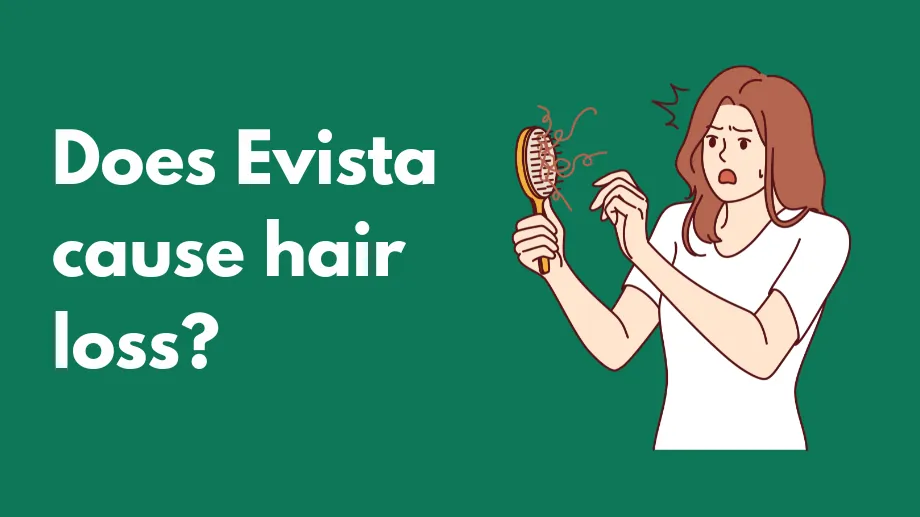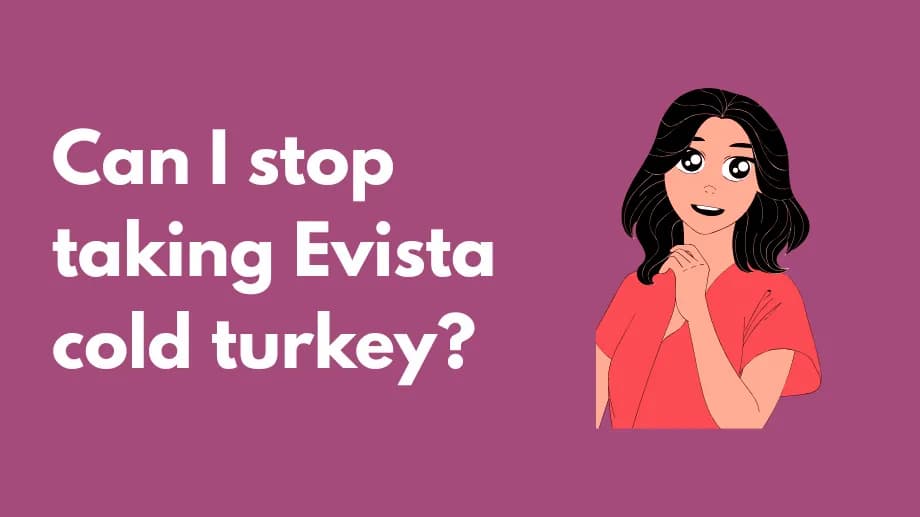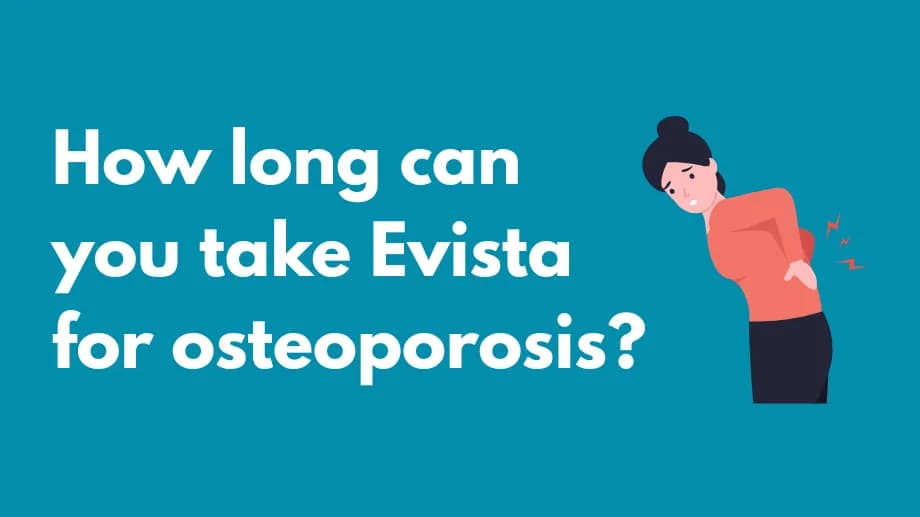Does Evista cause hair loss?

Evista (raloxifene) has helped many postmenopausal women strengthen their bones to help treat and prevent osteoporosis. It has also been used by certain women to reduce their risk of breast cancer. If you’re considering or currently taking Evista, you may have heard concerns about its potential to cause hair loss.
According to the package insert, hair loss was not listed as a side effect of the medication during clinical trials. Hair loss, also known as alopecia, can have various causes, including genetics, hormonal changes, medical conditions, medications, and lifestyle factors. Hair changes are also very common during menopause. You may have hair growth where you didn’t before or you might see hair thinning. This can be due to the changing levels of estrogen and progesterone during menopause and the effects they have on your hair follicles. Hair grows more slowly and falls out more easily in these cases.
If you have concerns about hair loss while taking Evista or any other medication, it is always recommended to consult with a healthcare professional. They can determine the cause and suggest the appropriate treatment options.
Evista FAQs
What is Evista used for?
Evista is a brand-name medication that is approved by the FDA to treat:
- Osteoporosis in postmenopausal women
- Reduce the risk of invasive breast cancer in postmenopausal women who have osteoporosis or are at a high risk for breast cancer
Your healthcare provider may advise you to take supplements such as vitamin D or calcium while you are taking Evista. Take them as directed.
How does Evista work?
The active ingredient in Evista is raloxifene hydrochloride. It is not a type of hormone therapy but belongs to a class called selective estrogen receptor modulators (SERMs). It works by mimicking the effects of estrogen in certain parts of the body.
In your bones, Evista acts like estrogen to help prevent your bones from breaking down. This improves your bone mineral density (BMD), which measures how dense your bones are. A higher BMD means your bones are stronger, which helps lower your risk of bone loss and fractures. In your breast, Evista blocks estrogen from entering cells, to help prevent it from turning on signals that make the cells cancerous.
What are the side effects of Evista?
The most common side effects of Evista include:
- Joint pain
- Flu-like symptoms
- Hot flashes and sweating
- Bronchitis
- Headache
- Nausea
- Leg cramps
- Diarrhea
- Swelling in the arms or legs
Other possible side effects of Evista may include:
- Insomnia
- Breast pain
- Dizziness
- Weight gain
Rarely, Evista can cause serious side effects, including:
- Serious, life-threatening allergic reactions (hives, swelling of your face, lips, tongue, or throat, and trouble breathing)
- Increased risk of blood clots
- Seek immediate medical attention if you have signs of a blood clot including sudden pain/redness/warmth in your arm or leg, chest pain, trouble breathing, coughing up blood, blurred vision, or loss of vision.
- Increased risk of stroke
Be sure to let your healthcare provider know if you have had a stroke in the past before starting Evista. Go to your nearest emergency room if you develop pain in your arms or legs, severe headaches, trouble breathing, sudden changes in your speech or vision, or sudden weakness on one side of your body.
Increased triglyceride levels
You may need to have your triglyceride levels tested regularly while on this medication.
Disclaimer: These are not all of the possible adverse effects of Evista. You should always seek medical advice from a healthcare professional for any questions or concerns about your medical condition or treatment. You should also read all the patient and drug information, including your Medication Guide that comes with Evista. You can report side effects to the FDA at 1-800-FDA-1088 or www.fda.gov/medwatch.
Shop Medications
Who should not take Evista?
You should not take Evista if you are allergic to raloxifene or any inactive ingredients in its formulation. You should also avoid Evista if you are pregnant, as it could harm your unborn baby.
Evista carries a boxed warning concerning the increased risk of blood clots and stroke. You should not take Evista if you have a current or previous blood clot. It should be taken with extreme caution if you have known heart disease or have an increased risk of stroke.
What should you tell your healthcare provider before taking Evista?
You should be sure your healthcare provider is aware of all your medical conditions as you may need increased monitoring during treatment. This includes:
- A history of breast cancer
- Liver or kidney problems
- High cholesterol or triglyceride levels
- Heart disease or high blood pressure
- Pregnancy or you plan on becoming pregnant because Evista may cause harm to your fetus.
- If you are breastfeeding or plan on breastfeeding because it is unknown if this medication is found in breast milk.
Is Evista safe to take with other medications?
When Evista is taken with other prescription drugs, nonprescription, over-the-counter medications, vitamins, herbal products, and supplements, it may change how they work or increase the risk of side effects. Some drug interactions with Evista may include:
- Blood thinners like warfarin
- Cholestyramine
- Estrogens
What should you do if you miss a dose of Evista?
If you miss a dose of Evista, take it as soon as you remember. If it is near the time of the next dose, skip the missed dose and take your next dose at its regular time. Do not take double doses to make up for a missed dose of Evista.
How long should you stay on Evista for osteoporosis?
Osteoporosis drugs like Evista are meant to be taken for long periods, typically several years. Your healthcare provider will monitor your bone and overall health during treatment to determine how long you stay on Evista.
Is Evista a hormone?
No, Evista is not a hormone, but it works by modifying the action of the hormone estrogen in your body. Evista can act like estrogen in some parts of the body (bones), but it can also block estrogen in other parts of the body (breast).
Which osteoporosis medication causes hair loss?
There are many variables that can impact hair growth, including genetics, age, medical conditions, hormone levels, stress, diet, and medications. One group of medications used for osteoporosis called bisphosphonate, has been linked to hair loss. In particular, Fosamax (alendronate), has had the highest number of reports. However, more research is needed to confirm that these medications are the cause of hair loss reported.
What medication is not recommended if you are on Evista?
There are several medications that can interact with Evista. For example, if you are on the blood thinner, warfarin, your doctor may need to do a blood test when you first start or if you need to stop taking Evista. They can then adjust your dose of warfarin as needed. There are 2 other medications, cholestyramine and estrogens, that you should not take if you are currently on Evista. Let your doctor know all the medications you are currently taking so they can make any appropriate changes to your therapy.
Related medications
- Nolvadex (tamoxifen)
- Fosamax (alendronate)
- Fosamax Plus D (alendronate/vitamin D)
- Actonel (risedronate)
- Actonel With Calcium (risedronate/calcium carbonate)
- Boniva (ibandronate)




